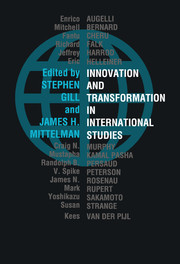Book contents
- Frontmatter
- Contents
- List of contributors
- Preface
- Acknowledgements
- Part I Rethinking and remaking the roots of global social and political theory
- Part II Political economy: the social and ecological anatomy of transformation
- Part III Transformation, innovation and emancipation in global political and civil society
- Part IV Reflections on global order in the twenty-first century
- 13 Civil society and democratic world order
- 14 Imposing global orders: a synthesised ontology for a turbulent era
- 15 The problem or the solution? Capitalism and the state system
- 16 Rethinking innovation in International Studies: global transformation at the turn of the millennium
- References
- Index of names
- Index of subjects
15 - The problem or the solution? Capitalism and the state system
Published online by Cambridge University Press: 05 July 2011
- Frontmatter
- Contents
- List of contributors
- Preface
- Acknowledgements
- Part I Rethinking and remaking the roots of global social and political theory
- Part II Political economy: the social and ecological anatomy of transformation
- Part III Transformation, innovation and emancipation in global political and civil society
- Part IV Reflections on global order in the twenty-first century
- 13 Civil society and democratic world order
- 14 Imposing global orders: a synthesised ontology for a turbulent era
- 15 The problem or the solution? Capitalism and the state system
- 16 Rethinking innovation in International Studies: global transformation at the turn of the millennium
- References
- Index of names
- Index of subjects
Summary
Behind the question, which theories best help to an explanation, there is a prior and a much more important question. It is this. What is it that we need to explain? It is the perennial question for every researcher, no matter what the field of study. It is said that Alice Toklas, sitting at the bedside as Gertrude Stein lay dying, sought one last word of wisdom from her idol. ‘Tell me, Gertrude’, she said, ‘what is the answer?’ (No doubt she had in mind the purpose of human life, the future of literature or some great puzzle.) ‘Ah,’ replied Gertrude with her last dying words, ‘but what is the question?’
That is about where those of us engaged in International Studies, and especially those of us brought up, as it were, in the study of interstate relations, have got to. It is not so much that we stand at a crossroads, uncertain which road to take. It is that we stand in a forest of ideas and facts, in gathering gloom and with no clear path ahead, only a tangle of bushes and overhanging branches. We do not know which way to go. The path that we have followed since our days as students seems, to me at least, to have died out. ‘Where to Next in International Studies?’ was appropriately chosen as the theme for the 1996 convention of the International Studies Association in San Diego, reflecting a widespread sense of uncertainty about the nature of the questions confronting us in the future.
- Type
- Chapter
- Information
- Innovation and Transformation in International Studies , pp. 236 - 247Publisher: Cambridge University PressPrint publication year: 1997
- 2
- Cited by



